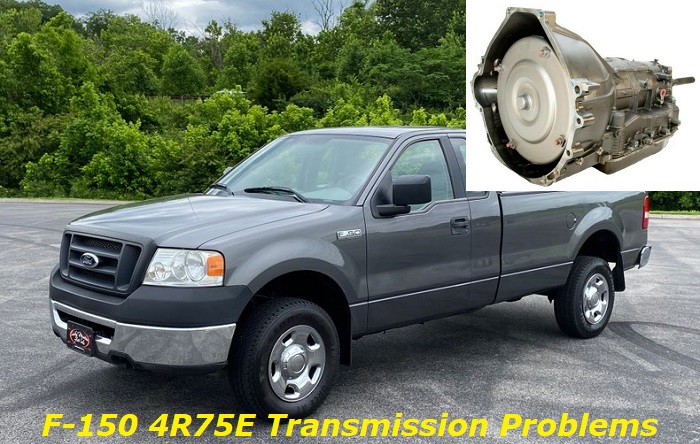Ford 4R75E Transmission Problems [Top 5 Easy Fixes]
Last Updated on August 11, 2023 by Robert Wilson
The Ford 4R75E transmission is a four-speed automatic transmission that was introduced in the 2001 model year.
It is based on the Ford 4R70W transmission and features an electronic control unit (ECU) that controls shift quality.
The ECU uses sensors to monitor engine speed, vehicle speed, and throttle position.
If the ECU detects a problem, it will enter into failsafe mode and prevent the transmission from shifting into overdrive or reverse.
Most Frequent Ford 4R75E Transmission Issues
Common problems with the 4R75E transmission include hard shifts, delayed engagement, slipping, fluid leaks, and overheating. Many of these problems can be traced back to the ECU.
When the ECU goes into failsafe mode, it limits the amount of torque that can be applied to the drivetrain.
This can cause hard shifts and delayed engagement when you try to accelerate from a stop.
Slipping can occur when the ECU mistimes a shift or when it doesn’t apply enough torque to engage the next gear.
Fluid leaks are often caused by worn seals or gaskets.
The 4R75E transmission is a popular option in Ford vehicles, but it’s not without its issues. One common problem is that the transmission can develop leaks.
This can be a major problem, as it can lead to transmission fluid getting on other parts of the car and causing damage.
Another issue is that the 4R75E can have trouble shifting into higher gears, which can be frustrating for drivers.
4R75E Transmission Overdrive Problems
The 4R75E transmission is an automatic transmission commonly used in Ford vehicles.
If you’re experiencing overdrive problems with 4R75E transmission, it could be due to several reasons:
- Overdrive Solenoid Issues: The overdrive solenoid is responsible for engaging and disengaging the overdrive gear. If the solenoid fails, it can cause problems with overdrive operation. A malfunctioning solenoid may result in difficulties shifting into or out of overdrive.
- Transmission Fluid and Filter: Dirty or old transmission fluid and a clogged filter can lead to poor transmission performance, including overdrive problems. Regular fluid changes and filter replacements are essential to maintain proper transmission function.
- Electrical Connections: Faulty wiring or poor electrical connections can disrupt the signals between the transmission control module and the transmission components, affecting overdrive operation.
- Throttle Position Sensor (TPS): The TPS informs the transmission control module about the throttle position, which affects gear shifting. If the TPS is malfunctioning, it might not properly engage or disengage overdrive.
- Transmission Control Module (TCM) Issues: The TCM controls the transmission’s shifting patterns, including overdrive engagement. A malfunctioning TCM could lead to improper overdrive operation.
- Mechanical Problems: Internal mechanical issues, such as worn clutches, bands, or gears, can also cause overdrive problems. These problems might require more in-depth diagnosis and repair.
- Vehicle Speed Sensor (VSS): The VSS provides information about vehicle speed to the TCM. If the VSS fails, it can affect the transmission’s ability to engage overdrive.
To diagnose and address the overdrive problems with your 4R75E transmission, it’s advisable to consult with a professional mechanic or a transmission specialist.
They can perform a thorough diagnostic scan, check the components, and provide appropriate solutions based on the specific issue detected.
Ford F150 Transmission Solenoid Problems
If you’re having problems with your Ford F150’s transmission, it could be due to a faulty transmission solenoid.
The transmission solenoid is responsible for controlling the flow of fluid within the transmission, and if it’s not working properly, it can cause all sorts of problems.
If you think your Ford F150’s transmission solenoid may be to blame for your transmission problems, there are a few things you can do to check.
- Erratic Shifting: If your F-150 is shifting erratically or hesitating between gears, it could be due to a faulty shift solenoid. These solenoids are responsible for opening and closing hydraulic circuits to engage specific gears. A malfunctioning solenoid can cause improper gear engagement.
- Stuck in Gear: A transmission solenoid that gets stuck in a particular gear can lead to difficulties in shifting. This might result in your F-150 being stuck in a single gear, preventing smooth acceleration or deceleration.
- Transmission Slipping: A failing solenoid can lead to transmission slipping, where the engine revs increase without a corresponding increase in vehicle speed. This can happen if the solenoid isn’t effectively controlling the transmission fluid pressure.
- Warning Lights: Modern vehicles, including the Ford F-150, have onboard diagnostics that can detect transmission issues. If a solenoid-related problem is detected, it might trigger the Check Engine Light or a specific transmission-related warning light.
- Poor Fuel Efficiency: Transmission solenoid problems can affect gear changes and overall transmission efficiency, leading to decreased fuel economy. If you notice a sudden drop in gas mileage, it could be related to solenoid issues.
Ford 4R75E Transmission Rebuild Kit
If your Ford 4R75E transmission is in need of a rebuild, you’ll be happy to know that there are several excellent rebuild kits available on the market.
In this section, we’ll take a look at some of the best kits available and help you decide which one is right for your needs.
One of the most popular rebuild kits for the 4R75E transmission is the ATSG Rebuild Kit.
This kit comes with everything you need to completely rebuild your transmission, including gaskets, seals, bearings, and gears.
It also includes detailed instructions that will make the job much easier. Another great option is the Transgo SK4R75E-HD2 Shift Kit.
This kit includes high-quality parts that will improve shifting performance and extend the life of your transmission.
It’s an excellent choice if you’re looking to upgrade your 4R75E transmission without spending a lot of money.
Finally, we have the Monster 4R75E Stage 1 Transmission Rebuild Kit.
This kit contains everything you need to build a reliable and powerful 4R75E transmission, including high-strength internals and an upgraded torque converter.
If you’re looking for maximum performance from your 4R75E transmission, this is the kit for you.
4R75E Transmission for Sale
If you’re in the market for a 4R75E transmission, there are a few things you should know. The 4R75E is a four-speed automatic transmission that was first introduced in 2003. It’s been used in a variety of Ford vehicles, including the F-150, Expedition, and Mustang.
It’s known for being a reliable transmission, and it’s often used as an upgrade over the older 4R70W transmission.
There are a few different places you can buy a 4R75E transmission. You can find them new from Ford or from aftermarket suppliers.
You can also find them used, but be sure to have a qualified mechanic inspect it before purchase. When shopping for a 4R75E transmission, keep an eye out for special features like upgraded clutches or strengthened internals. These can improve performance and longevity.
Once you’ve found the perfect 4R75E transmission for your needs, have it installed by a qualified technician.
They’ll be able to properly connect all of the electrical components and ensure that everything is functioning correctly.
Is the 4R75E a Good Transmission
There are a lot of people out there that swear by the 4R75E transmission. They love the fact that it’s a very reliable transmission and that it’s affordable.
While the 4R75E may not be the newest or most technologically advanced transmission on the market, it’s still a great choice for those who are looking for a dependable and affordable option.

What Years Did Ford Use the 4R75E Transmission?
The 4R75E transmission was used in the following Ford vehicles: 2004 – 2006 Ford F-150 2007 – 2009 Ford Edge.
2007 – 2010 Ford Explorer Sport Trac 2008 – 2010 Ford Taurus X The 4R75E transmission is a four-speed automatic transmission that was introduced in 2004.
It is similar to the 4R70W transmission, but it has an upgraded torque converter and pump assembly. The 4R75E transmission is used in a variety of Ford vehicles, including the F-150, Edge, Explorer Sport Trac, and Taurus X.
What Year Fords Have Transmission Problems?
The most recent issue seems to be with the Ford Focus and Fiesta models from 2012-2016. These cars are equipped with a six-speed dual clutch automatic transmission, and there have been reports of premature wear, fluid leaks, and shifting issues.
In some cases, these problems have caused the car to stall or lose power while driving. There have also been a few reports of transmission problems with Ford Escape and Fusion models from 2013-2016.
These cars have a six-speed automatic transmission, and there have been reports of hard shifts, delayed engagement, and fluid leaks.
How Much Does It Cost to Rebuild a 4R75E Transmission?
The cost of rebuilding a 4R75E transmission will vary depending on the severity of the damage and the quality of the parts used. However, you can expect to pay anywhere from $1,500 to $3,000 for a complete rebuild.
What Ford Models Have Transmission Problems?
Some of the most notable include the Ford Explorer, Ford F-150, and Ford Focus. Transmission issues can range from simple things like fluid leaks to more serious problems like complete failure.
In some cases, transmission problems can be caused by recalls or design flaws. No matter what the cause, transmission problems can be expensive to fix and may even require a new transmission.
Ford F-150 4R70E 4R75E Transmissions Loss of 4th Gear Overdrive: The Most Common Cause and Fix
Conclusion
The Ford 4R75E Transmission enjoys widespread popularity and finds application in a diverse range of vehicles.
Typical issues observed in the 4R75E transmission encompass firm shifts, delayed activation, slippage, fluid seepage, and excessive heat build-up. A number of these concerns can be attributed to the Electronic Control Unit (ECU).
These issues can stem from various factors, yet the primary contributor often boils down to the natural wear and tear experienced by the transmission.
If you’re encountering any of these 4R75E transmission problems, it’s crucial to have your vehicle assessed by a skilled mechanic or transmission specialist.

